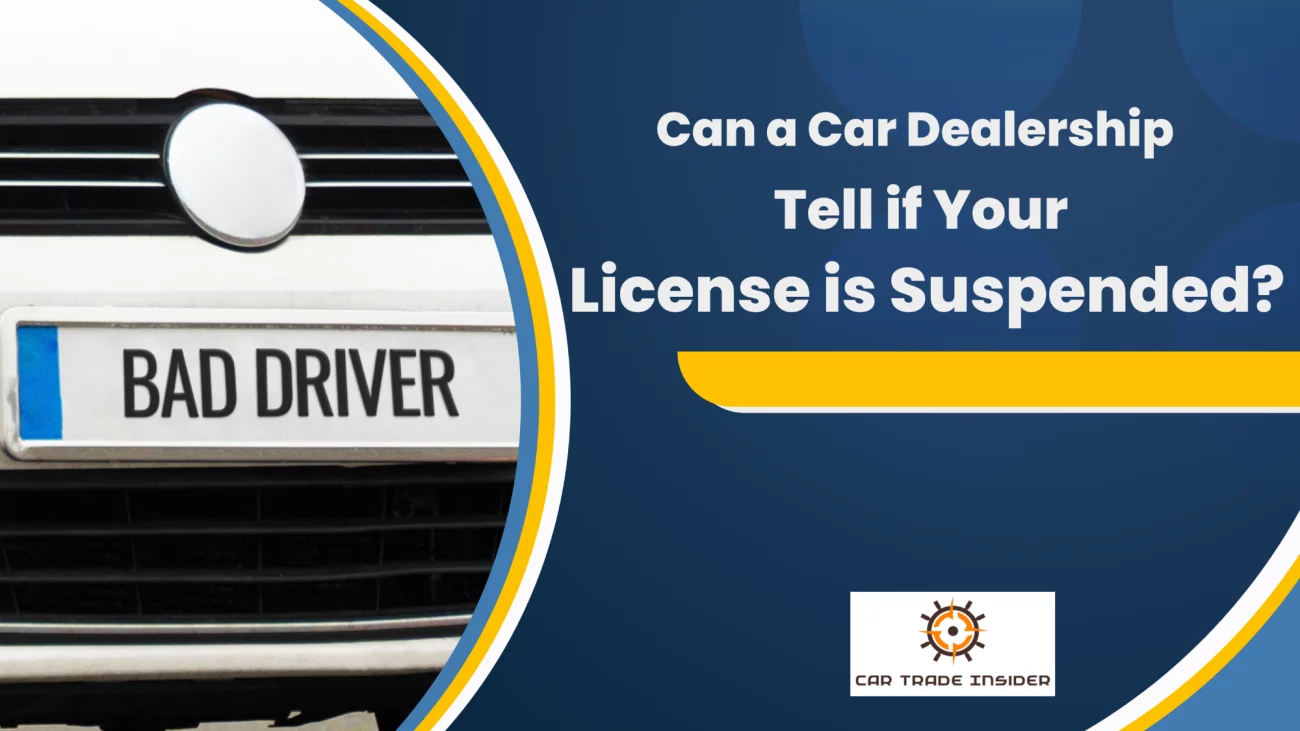Absolutely, car dealerships can identify if your license is suspended through a background check from government-managed databases such as the Department of Motor Vehicles. They also usually require proof of insurance before a sale. Therefore, a suspended license and lack of insurance could result in a dealership refusing the car sale.
Understanding can a car dealership tell if your license is suspended is crucial not only for individuals with a suspended license but also for everyone involved in the car-buying process. It raises questions about legal obligations, customer safety, and ethical considerations.
This comprehensive guide will delve into the nitty-gritty of the car dealership industry, license checks, implications of a suspended license, consumer rights, dealership responsibilities, and more.
Understanding Suspended Licenses
Being suspended means you’re not legally allowed to drive. Driving on public roads can lead to arrest. A suspended license is a temporary withdrawal of driving privileges due to violations such as DUI, reckless driving, or accumulating too many points for traffic violations.
Driving with a suspended license can lead to severe legal consequences, including fines, imprisonment, and further suspension. You can check your license status online or contact your state’s DMV. Suspension notifications are typically sent by mail.
The Rationale Behind License Verification
By verifying licenses, dealerships manage risks, such as legal repercussions of selling cars to unlicensed drivers, while meeting their legal obligations.
License checks also protect public safety by ensuring that only qualified, licensed individuals purchase and potentially operate vehicles.
There have been cases where individuals with a suspended license purchased a car, leading to legal ramifications for both the buyer and the dealership. These cases underline the importance of accurate license verification and honest communication between the dealership and the buyer.
How do Car Dealerships Check if Your License is Suspended?
Car dealerships typically utilize electronic verification systems to check the validity of a driver’s license in real time. Electronic verification systems cross-reference the information provided by the buyer with the Department of Motor Vehicles (DMV) and law enforcement databases to confirm license validity.
The DMV keeps comprehensive records of all licensed drivers, including license status and any suspensions or violations.
While there’s no direct line of communication between car dealerships and law enforcement, electronic verification systems access data from law enforcement databases to verify license status.
Can Car Dealerships Identify a Recent Suspended License?
While electronic verification systems are efficient, they may not always detect a very recent suspension that hasn’t been updated in the databases yet. Dealerships can verify the validity of a license but may not always be able to identify a recently suspended license.
Consequences for Dealerships Violating License-Related Policies
Selling a car to a person with a suspended license could potentially lead to legal issues for the dealership if the buyer causes an accident.
Dealerships found guilty of violating these policies could face legal penalties, including fines, license revocations, and more. Moreover, violation of license-related policies can tarnish a dealership’s reputation, leading to decreased trust and business loss.
Responsibilities of the Car Buyer
Buyers with a suspended license should understand their legal obligations and the potential risks of attempting to purchase a car. These include providing accurate information about your license status to the dealership. Honesty and transparency in the car buying process are crucial, not only for the buyer but also for the dealership.
Appropriate actions include waiting until the suspension period is over or exploring alternative transportation options.
Conclusion
Yes, a car dealership can indeed determine if your license is suspended. Dealerships typically conduct a background check on potential buyers which includes checking for any outstanding warrants or suspended licenses.
The information in these checks is retrieved from databases managed by government agencies like the Department of Motor Vehicles.
Furthermore, it’s standard procedure for dealerships to ask for proof of insurance before finalizing a car sale. The lack of valid insurance coverage, coupled with a suspended license, is likely to lead to the dealership refusing the car sale. It’s essential to remember that these precautions are in place to protect all parties involved and to ensure the legality and safety of the car-buying process.
Frequently Asked Questions
Can a Car Dealership Sell Me a Car if My License is Suspended?
Yes, a dealership can technically sell you a car regardless of your license status, as ownership and the ability to legally operate a vehicle are separate matters. However, many dealerships will perform license checks for liability reasons and may refuse to sell if your license is suspended. For more information, check out our guide on whether can you buy a car with a suspended license.
How Can I Check If My License is Suspended?
You can check the status of your license by visiting your local DMV office or checking online through the DMV’s website, if available in your state.
What Should I Do If a Dealership Sells Me a Car Despite a Suspended License?
If a dealership sells you a car knowing that your license is suspended, you could potentially report them to the local authorities or the DMV, as this may be considered a breach of ethical conduct.
What Are the Consequences of Driving with a Suspended License?
Driving with a suspended license can lead to severe penalties, including hefty fines, increased suspension time, probation, or even jail time.
Can a Dealership Report a Suspended License to the Authorities?
If a dealership becomes aware of a suspended license during the verification process, they are under no specific legal obligation to report it. However, if they knowingly allow an individual with a suspended license to drive a car off the lot, they could be held partially liable in the event of an accident.


